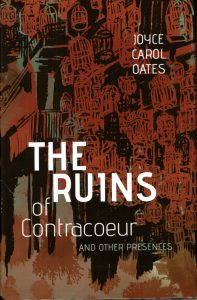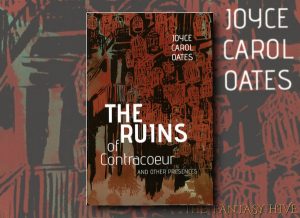THE RUINS OF CONTRACOEUR AND OTHER PRESENCES by Joyce Carol Oates (BOOK REVIEW)
“What is interesting here, from a disinterested/objective perspective, is how the unimaginable improbable will become, within a surprisingly short period of time, the imagined probable.
How the lurid-freakish becomes, within that period of time, particularly if experienced on a daily, hourly basis, in a familiar and delimited space like a family household, normal.
What was accepted as the old normal is soon overcome by the new normal.
Eventually then, simply the normal.
For all things shift, as if tugged by gravity, to the normal.”
Those who are familiar with the work of Joyce Carol Oates will know that she is as much a master of the Weird fiction short story as she is a multi-award-winning literary icon. The Ruins of Contracoeur (2021), her latest collection of short fiction, features longish short stories published between 1999 and 2020 in venues as diverse as Playboy and Red Shift: Extreme Visions of Speculative Fiction (2001). It confirms her as a writer whose engagement with the Weird only grows stronger each year. The six stories in the collection show Oates’ mastery of the form, across grisly body horror, experimental reflection, deep character study and sharp revenge fantasy. Across widely varying tone, from black comedy to utterly chilling, Oates is a writer utterly in command of her voice. Published by the Swan River Press with lush cover art by Meggan Kehrli and a thoughtful and incisive introduction by fellow master of the Weird short story Lisa Tuttle, The Ruins of Contracoeur is essential reading for fans of Oates’ work and a great introduction for the curious.
 Collection opener ‘Mr. Stickum’ sets the dark and disturbing tone perfectly. The story is told from the point of view of a gang of schoolgirls who discover a child sex trafficking ring operating in their area, and decide to get revenge for all the exploited children by building a trap, the heart of which is the eponymous Mr. Stickum. The story immediately establishes Oates’ incredible command of voice, her ability to place the reader inside her characters’ perspectives. She captures the thrill of these intelligent young woman who, upon learning of the unpleasant reality, work together to solve their problem, a visceral response to the loss of innocence. The story unflinchingly explores the dark secrets hidden away by families and communities, as the girls recognise many of their victims from school or their own relatives. It also displays something that will become a recurring theme throughout the collection – the strength of Oates’ approach to the Weird is the way that she acknowledges the uncanny’s relationship to the mundane. These stories are disturbing because the transgressive and the strange cause a disruption in the characters’ lives, but their lives must continue around this traumatic event, creating a new normality that is unrecognisable compared to their lives before.
Collection opener ‘Mr. Stickum’ sets the dark and disturbing tone perfectly. The story is told from the point of view of a gang of schoolgirls who discover a child sex trafficking ring operating in their area, and decide to get revenge for all the exploited children by building a trap, the heart of which is the eponymous Mr. Stickum. The story immediately establishes Oates’ incredible command of voice, her ability to place the reader inside her characters’ perspectives. She captures the thrill of these intelligent young woman who, upon learning of the unpleasant reality, work together to solve their problem, a visceral response to the loss of innocence. The story unflinchingly explores the dark secrets hidden away by families and communities, as the girls recognise many of their victims from school or their own relatives. It also displays something that will become a recurring theme throughout the collection – the strength of Oates’ approach to the Weird is the way that she acknowledges the uncanny’s relationship to the mundane. These stories are disturbing because the transgressive and the strange cause a disruption in the characters’ lives, but their lives must continue around this traumatic event, creating a new normality that is unrecognisable compared to their lives before.
Oates explores the fallout from trauma in intense, close first person in ‘The Cold’, which explores a woman suffering from the aftermath of a miscarriage who is losing her grip on reality. The story is a powerful exploration of suffocating grief, brave and unflinching. Oates uses the motif of being haunted by a coldness, which echoes H. P. Lovecraft’s ‘Cool Air’ (1928), but where Lovecraft’s story is about defying death, Oates repurposes it to explore the abjection of failed pregnancy. ‘Monstersister’ is a gruesome tale of body horror, in which a girl who absorbed her twin in the womb births her through a growth on the back of her head. Again abjection looms large, with the monstrous sister being literally ejected from the older sister’s body, but then twisted family dynamics lead to the monstrous sister being welcomed into the body of the family whilst the older sister is rejected. It is a visceral and disturbing exploration of the family unit and what it means to not belong, to be cast out.
‘Commencement’ is a slice of pure dark humour in which the self-important pompous rituals of academia hide rituals of a darker, bloodier nature. Oates takes satirical aim at the petty internal politics that shape academia and its obsession with initiations and graduations. The tedium of the graduation ceremony, the self-congratulatory attitude of the honoured guests and the in-fighting amongst the faculty make the whole thing instantly recognisable, and makes the horror interrupting from this familiar setting all the more striking. ‘Redwoods’ is the collection’s most daring and experimental narrative. It tells the tale of a man who, following his death, is left navigating the various possible outcomes of a seemingly trivial encounter with strangers in the redwood forests that winds up being the central hub of his entire life. Oates expertly weaves a tale of lives not lived, regrets and mistakes in an ambitious, non-linear narrative that hops across timelines and contingencies. The story demonstrates Oates’ ability to experiment with narrative form in order to provide a detailed and poignant character study.
The longest story in the collection, and the oldest, ‘The Ruins of Contracoeur’ is Oates at her unparalleled best. Like the novels in her classic Gothic Quintet, the story focuses on a troubled family saga, which shades in and out of the fantastic and the horrific until classifying it becomes a futile endeavour. It is the story of a family forced to leave the city in disgrace to take up residence in the ruined country house Cross Hill. As the children slowly become aware of the historical disgrace of their ancestor who originally built the house and the truth about their father’s fall from grace, it becomes clear that Cross Hill is haunted by the family’s history and by more physical apparitions. A taught and beautifully written chronicle of the family’s collective decent into madness and worse, it’s exactly the kind of story that no one else can do as well as Oates. It is a fitting conclusion to the collection, which as a whole serves as a reminder of Oates’ talents and her key place in the worlds of literary and Weird fiction.

